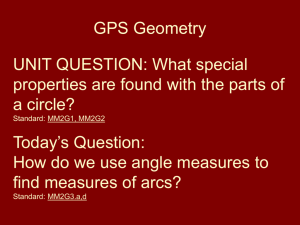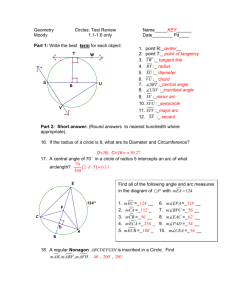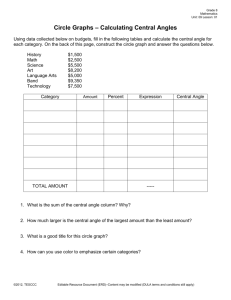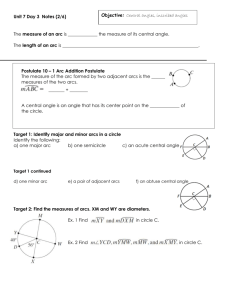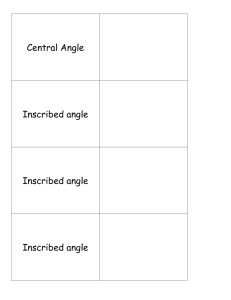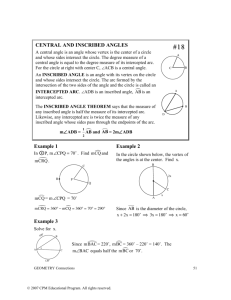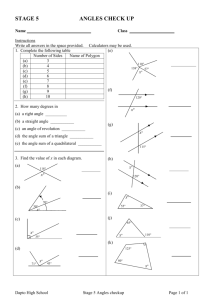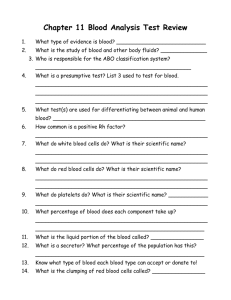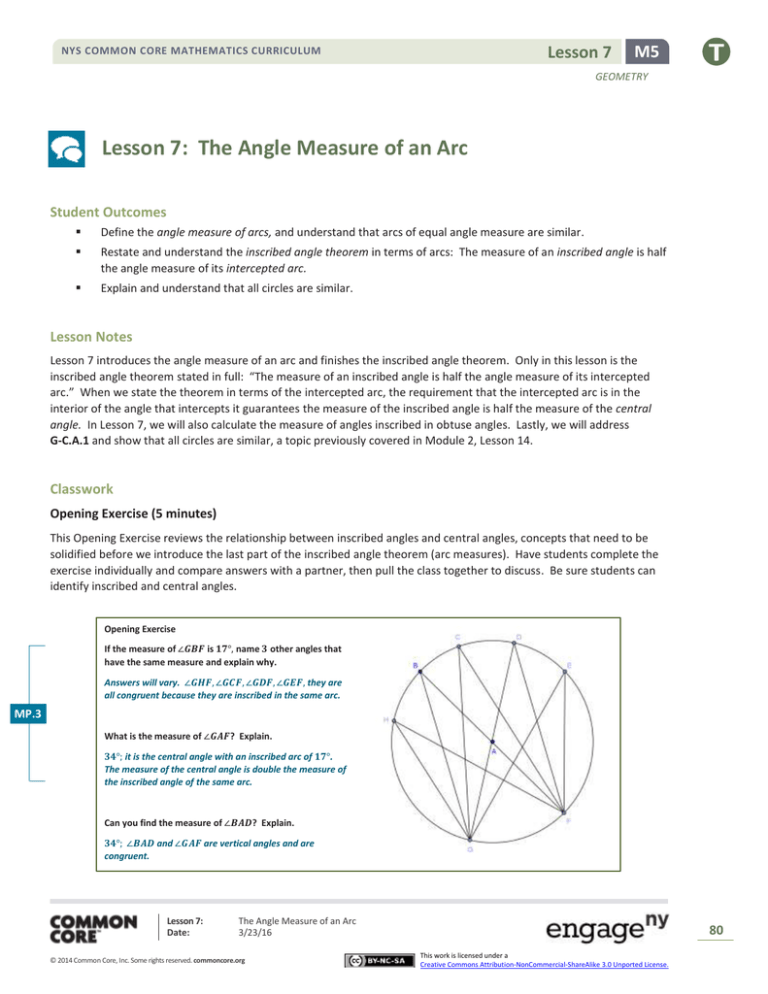
Lesson 7
NYS COMMON CORE MATHEMATICS CURRICULUM
M5
GEOMETRY
Lesson 7: The Angle Measure of an Arc
Student Outcomes
Define the angle measure of arcs, and understand that arcs of equal angle measure are similar.
Restate and understand the inscribed angle theorem in terms of arcs: The measure of an inscribed angle is half
the angle measure of its intercepted arc.
Explain and understand that all circles are similar.
Lesson Notes
Lesson 7 introduces the angle measure of an arc and finishes the inscribed angle theorem. Only in this lesson is the
inscribed angle theorem stated in full: “The measure of an inscribed angle is half the angle measure of its intercepted
arc.” When we state the theorem in terms of the intercepted arc, the requirement that the intercepted arc is in the
interior of the angle that intercepts it guarantees the measure of the inscribed angle is half the measure of the central
angle. In Lesson 7, we will also calculate the measure of angles inscribed in obtuse angles. Lastly, we will address
G-C.A.1 and show that all circles are similar, a topic previously covered in Module 2, Lesson 14.
Classwork
Opening Exercise (5 minutes)
This Opening Exercise reviews the relationship between inscribed angles and central angles, concepts that need to be
solidified before we introduce the last part of the inscribed angle theorem (arc measures). Have students complete the
exercise individually and compare answers with a partner, then pull the class together to discuss. Be sure students can
identify inscribed and central angles.
Opening Exercise
If the measure of ∠𝑮𝑩𝑭 is 𝟏𝟕°, name 𝟑 other angles that
have the same measure and explain why.
Answers will vary. ∠𝑮𝑯𝑭, ∠𝑮𝑪𝑭, ∠𝑮𝑫𝑭, ∠𝑮𝑬𝑭, they are
all congruent because they are inscribed in the same arc.
MP.3
What is the measure of ∠𝑮𝑨𝑭? Explain.
𝟑𝟒°; it is the central angle with an inscribed arc of 𝟏𝟕°.
The measure of the central angle is double the measure of
the inscribed angle of the same arc.
Can you find the measure of ∠𝑩𝑨𝑫? Explain.
𝟑𝟒°; ∠𝑩𝑨𝑫 and ∠𝑮𝑨𝑭 are vertical angles and are
congruent.
Lesson 7:
Date:
The Angle Measure of an Arc
3/23/16
© 2014 Common Core, Inc. Some rights reserved. commoncore.org
80
This work is licensed under a
Creative Commons Attribution-NonCommercial-ShareAlike 3.0 Unported License.
Lesson 7
NYS COMMON CORE MATHEMATICS CURRICULUM
M5
GEOMETRY
Discussion (15 minutes)
This lesson begins with a full class discussion that ties what students know about central
angles and inscribed angles to relating these angles to the arcs they are inscribed in, which
is a new concept. In this discussion, we will define some properties of arcs. As properties
are defined, list them on a board or large paper so students can see them.
We have studied the relationship between central angles and inscribed angles.
Can you help define an inscribed angle?
Can you help me define a central angle?
Provide students a copy of
the picture if they have
difficulty creating the
drawing.
As definitions are given
and as new terms are
added, have students
repeat each definition and
term aloud.
Create a definition wall.
Answers will vary. A central angle for a circle is an angle whose vertex is
at the center of the circle.
Let’s draw a circle with an acute central angle.
An angle is inscribed in an arc if the sides of the angle contain the
endpoints of the arc; the vertex of the angle is a point on the circle, but
not an endpoint on the arc.
Scaffolding:
Students draw a circle with an acute central angle.
Display the picture below.
Scaffolding:
How many arcs does this central angle divide this circle into?
Provide students a graphic
organizer for arcs (major
and minor).
For ELL students, do choral
repetition of major and
minor arcs using hand
gestures (arms wide for
major and close together
for minor).
2
What do you notice about the two arcs?
One is longer than the other is. One arc is contained in the
angle and its interior, and one arc is contained in the angle and
its exterior. (Students might say “inside the angle” or “outside
the angle.” Help them to state it precisely.)
In a circle with center 𝑂, let 𝐴 and 𝐵 be different points that lie on the
circle but are not the endpoints of a diameter. The minor arc between
𝐴 and 𝐵 is the set containing 𝐴, 𝐵, and all points of the circle that are
in the interior of ∠𝐴𝑂𝐵.
Explain to your neighbor what a minor arc is, and write the definition.
Lesson 7:
Date:
The Angle Measure of an Arc
3/23/16
© 2014 Common Core, Inc. Some rights reserved. commoncore.org
81
This work is licensed under a
Creative Commons Attribution-NonCommercial-ShareAlike 3.0 Unported License.
NYS COMMON CORE MATHEMATICS CURRICULUM
Lesson 7
M5
GEOMETRY
̂ (𝐴𝐵 with an arc over them). Write this on
The way we show a minor arc using mathematical symbols is 𝐴𝐵
your drawing.
Can you predict what we call the larger arc?
The major arc.
Now, let’s write the definition of a major arc.
In a circle with center 𝑂, let 𝐴 and 𝐵 be different points that lie on the circle but are not the endpoints
of a diameter. The major arc is the set containing 𝐴, 𝐵, and all points of the circle that lie in the
exterior of ∠𝐴𝑂𝐵.
̂?
Can we call it 𝐴𝐵
̂.
No, because we already called the minor arc 𝐴𝐵
̂ where 𝑋 is any point on the circle outside of the central angle. Label the
We would write the major arc as 𝐴𝑋𝐵
major arc.
Can you define a semicircle in terms of arc?
In a circle, let 𝐴 and 𝐵 be the endpoints of a diameter. A semicircle is the set containing 𝐴, 𝐵, and all
points of the circle that lie in a given half-plane of the line determined by the diameter.
̂ is?
If I know the measure of ∠𝐴𝑂𝐵, what do you think the angle measure of 𝐴𝐵
Let’s say that statement.
The same measure.
The angle measure of a minor arc is the measure of the corresponding central angle.
What do you think the angle measure of a semicircle is? Why?
180°. It is half a circle, and a circle measures 360°.
̂ . If the angle measure of 𝐴𝐵
̂ is 20°, what do you think the angle measure of 𝐴𝑋𝐵
̂ would
Now let’s look at 𝐴𝑋𝐵
be? Explain.
340° because it is the other part of the circle not included in the 20°. Since a full circle is 360°, the part
not included in the 20° would equal 340°.
Discuss what we have just learned about minor and major arcs and semicircles and their measures with a
partner.
̂ is 20°, can you find the
Look at the diagram. If 𝐴𝐵
̂ and 𝐸𝐹
̂ ? Explain.
angle measure of 𝐶𝐷
All are 20° because they all have the same
central angle. The circles are dilations of
each other, so angle measurement is
conserved and the arcs are similar.
We are discussing angle measure of the arcs, not
length of the arcs. Angle measure is only the
amount of turning that the arc represents, not how
long the arc is. Arcs of different lengths can have
the same angle measure. Two arcs (of possibly
different circles) are similar if they have the same
angle measure. Two arcs in the same or congruent circles are congruent if they have the same angle measure.
Explain these statements to your neighbor. Can you prove it?
Lesson 7:
Date:
The Angle Measure of an Arc
3/23/16
© 2014 Common Core, Inc. Some rights reserved. commoncore.org
82
This work is licensed under a
Creative Commons Attribution-NonCommercial-ShareAlike 3.0 Unported License.
Lesson 7
NYS COMMON CORE MATHEMATICS CURRICULUM
M5
GEOMETRY
̂ and 𝐶𝐷
̂ are adjacent. Can you
In this diagram, I can say that 𝐵𝐶
write a definition of adjacent arcs?
Two arcs on the same circle are adjacent if they share
exactly one endpoint.
̂ = 25° and 𝐶𝐷
̂ = 35°, what is the angle measure of 𝐵𝐷
̂?
If 𝐵𝐶
Explain.
60°. Since they were adjacent, together they create a
larger arc whose angle measures can be added
together. Or, calculate the measure of the arc as
360 − (25 + 35), as the representation could be from
𝐵 to 𝐷 without going through point 𝐶.
This is a parallel to the 180 protractor axiom (angles add). If
̂ = 𝑚𝐴𝐵
̂ + 𝑚𝐵𝐶
̂.
𝐴𝐵 and 𝐵𝐶 are adjacent arcs, then 𝑚𝐴𝐶
Central angles and inscribed angles intercept arcs on a circle. An angle intercepts an arc if the endpoints of the
arc lie on the angle, all other points of the arc are in the interior of the angle, and each side of the angle
contains an endpoint of the arc.
Draw a circle and an angle that intercepts an arc and an angle that does not. Explain your drawing to your
neighbor.
Tell your neighbor the relationship between the measure of a
central angle and the measure of the inscribed angle
intercepting the same arc.
Answers will vary.
The measure of the central angle is double the measure
of any inscribed angle that intercepts the same arc.
Using what we have learned today, can you state this in terms
of the measure of the intercepted arc?
The measure of an inscribed angle is half the angle
measure of its intercepted arc. The measure of a central
angle is equal to the angle measure of its intercepted
arc.
Lesson 7:
Date:
The Angle Measure of an Arc
3/23/16
© 2014 Common Core, Inc. Some rights reserved. commoncore.org
83
This work is licensed under a
Creative Commons Attribution-NonCommercial-ShareAlike 3.0 Unported License.
Lesson 7
NYS COMMON CORE MATHEMATICS CURRICULUM
M5
GEOMETRY
Example 1 (8 minutes)
This example extends the inscribed angle theorem to obtuse angles; it also shows the relationship between the measure
of the intercepted arc and the inscribed angle. Students will need a protractor.
Example 1
What if we started with an angle inscribed in the minor arc between
𝑨 and 𝑪?
Draw a point 𝐵 on the minor arc between 𝐴 and 𝐶.
Draw the arc intercepted by ∠𝐴𝐵𝐶? Make it red in your
diagram.
Students draw the arc and color it red.
In your diagram, do you think the measure of an arc between
𝐴 and 𝐶 is half of the measure of the inscribed angle? Why or
why not?
Students draw point 𝐵.
The phrasing and explanations can vary. However,
there is one answer; the measure of the inscribed arc
is twice the measure of the inscribed angle.
Using your protractor, measure ∠𝐴𝐵𝐶. Write your answer on
your diagram.
Answers will vary.
Now measure the arc in degrees. Students may struggle with this, so ask…
Can you think of an easier way to measure this arc in degrees?
We could measure ∠𝐴𝑂𝐶, and then subtract that measure from 360°
Write the measure of the arc in degrees on your diagram.
Do your measurements support the inscribed angle theorem? Why or why not?
Yes, the measure of the inscribed angle is half the measure of its intercepted arc.
Compare your answer and diagram to your neighbor’s answer and diagram.
Lesson 7:
Date:
The Angle Measure of an Arc
3/23/16
© 2014 Common Core, Inc. Some rights reserved. commoncore.org
84
This work is licensed under a
Creative Commons Attribution-NonCommercial-ShareAlike 3.0 Unported License.
Lesson 7
NYS COMMON CORE MATHEMATICS CURRICULUM
M5
GEOMETRY
Restate the inscribed angle theorem in terms of intercepted arcs.
The measure of an inscribed angle is half the angle measure of its
intercepted arc.
Exercises 1–4 (5 minutes)
1.
̂ : 𝑪𝑬
̂ : 𝑬𝑫
̂ :̂
̂ = 𝟏: 𝟐: 𝟑: 𝟒. Find
In circle 𝑨, 𝑩𝑪
𝑫𝑩
a.
𝒎∠𝑩𝑨𝑪
𝟑𝟔°
b.
Scaffolding:
Help students see the
connection between the
central angles and
inscribed angle by colorcoding.
Outline central angle in
red.
Outline the inscribed angle
that has the same
intercepted arc as the
central angle in blue.
𝒎∠𝑫𝑨𝑬
𝟏𝟎𝟖°
c.
̂
𝒎𝑫𝑩
𝟏𝟒𝟒°
d.
̂
𝒎𝑪𝑬𝑫
𝟏𝟖𝟎°
2.
In circle 𝑩, 𝑨𝑩 = 𝑪𝑫. Find
a.
̂
𝒎𝑪𝑫
𝟔𝟎°
b.
̂
𝒎𝑪𝑨𝑫
𝟑𝟎𝟎°
c.
̂
𝒎𝑨𝑫
𝟏𝟖𝟎°
3.
̅̅̅̅ is a diameter and 𝒎∠𝑫𝑨𝑪 = 𝟏𝟎𝟎°. If 𝒎𝑬𝑪
̂ = 𝟐𝒎𝑩𝑫
̂,
In circle 𝑨, 𝑩𝑪
find
a.
𝒎∠𝑩𝑨𝑬
𝟐𝟎°
b.
̂
𝒎𝑬𝑪
𝟏𝟔𝟎°
Lesson 7:
Date:
The Angle Measure of an Arc
3/23/16
© 2014 Common Core, Inc. Some rights reserved. commoncore.org
85
This work is licensed under a
Creative Commons Attribution-NonCommercial-ShareAlike 3.0 Unported License.
Lesson 7
NYS COMMON CORE MATHEMATICS CURRICULUM
M5
GEOMETRY
c.
̂
𝒎𝑫𝑬𝑪
𝟐𝟔𝟎°
Given circle A with 𝒎∠𝑪𝑨𝑫 = 𝟑𝟕°, find
4.
a.
̂
𝒎𝑪𝑩𝑫
𝟑𝟐𝟑°
b.
𝒎∠𝑪𝑩𝑫
𝟏𝟖. 𝟓°
c.
𝒎∠𝑪𝑬𝑫
𝟏𝟔𝟏. 𝟓°
Example 2 (4 minutes)
In this example, students will ponder the question, “Are all circles similar?” This is intuitive but easy to show, as the ratio
of the circumference of two circles is equal to the ratio of the diameters and the ratio of the radii.
Project the circle at right on the board.
What is the circumference of this circle in terms of radius, 𝑟?
What if we double the radius, what is the circumference?
The radius. The only variable in the formula is 𝑟 (radius), so as radius changes, the size of the circle
changes.
Does the shape of the circle change? Explain.
2𝜋(3)𝑟 = 6𝜋
What determines the circumference of a circle? Explain.
2𝜋(2𝑟) = 4𝜋
What if we triple the original radius, what is the circumference?
2𝜋𝑟
All circles have the same shape; they are just different sizes depending on the length of the radius.
What does this mean is true of all circles?
All circles are similar.
Lesson 7:
Date:
The Angle Measure of an Arc
3/23/16
© 2014 Common Core, Inc. Some rights reserved. commoncore.org
86
This work is licensed under a
Creative Commons Attribution-NonCommercial-ShareAlike 3.0 Unported License.
Lesson 7
NYS COMMON CORE MATHEMATICS CURRICULUM
M5
GEOMETRY
Closing (3 minutes)
Call class together, and show the diagram.
Express the measure of the central angle and the inscribed angle in
terms of the angle measure 𝑥 ∘ .
The central angle ∠𝐶𝐴𝐷 has a measure of 𝑥 ° .
The inscribed angle ∠𝐶𝐵𝐷 has a measure of 𝑥 ° .
1
2
State the inscribed angle theorem to your neighbor.
The measure of an inscribed angle is half the angle measure
of its intercepted arc.
Lesson Summary
THEOREMS:
INSCRIBED ANGLE THEOREM: The measure of an inscribed angle is half the measure of its
intercepted arc.
Two arcs (of possibly different circles) are similar if they have the same angle measure. Two arcs in the
same or congruent circles are congruent if they have the same angle measure.
All circles are similar.
Relevant Vocabulary
ARC: An arc is a portion of the circumference of a circle.
MINOR AND MAJOR ARC: Let 𝑪 be a circle with center 𝑶, and let 𝑨 and 𝑩 be different points
that lie on 𝑪 but are not the endpoints of the same diameter. The minor arc is the set
containing 𝑨, 𝑩, and all points of 𝑪 that are in the interior of ∠𝑨𝑶𝑩. The major arc is the
set containing 𝑨, 𝑩, and all points of 𝑪 that lie in the exterior of ∠𝑨𝑶𝑩.
SEMICIRCLE: In a circle, let 𝑨 and 𝑩 be the endpoints of a diameter. A semicircle is the set containing 𝑨, 𝑩,
and all points of the circle that lie in a given half-plane of the line determined by the diameter.
INSCRIBED ANGLE: An inscribed angle is an angle whose vertex is on a circle and each side of
the angle intersects the circle in another point.
CENTRAL ANGLE: A central angle of a circle is an angle whose vertex is the center of a circle.
INTERCEPTED ARC OF AN ANGLE: An angle intercepts an arc if the endpoints of the arc lie on the
angle, all other points of the arc are in the interior of the angle, and each side of the angle
contains an endpoint of the arc.
Exit Ticket (5 minutes)
Lesson 7:
Date:
The Angle Measure of an Arc
3/23/16
© 2014 Common Core, Inc. Some rights reserved. commoncore.org
87
This work is licensed under a
Creative Commons Attribution-NonCommercial-ShareAlike 3.0 Unported License.
Lesson 7
NYS COMMON CORE MATHEMATICS CURRICULUM
M5
GEOMETRY
Name
Date
Lesson 7: Properties of Arcs
Exit Ticket
1.
Given circle 𝐴 with diameters ̅̅̅̅
𝐵𝐶 and ̅̅̅̅
𝐷𝐸
̂
and 𝑚𝐶𝐷 = 56°.
a.
Name a central angle.
b.
Name an inscribed angle.
c.
Name a chord that is not a diameter.
d.
What is the measure of ∠𝐶𝐴𝐷?
e.
What is the measure of ∠𝐶𝐵𝐷?
f.
Name 3 angles of equal measure.
g.
̂?
What is the degree measure of 𝐶𝐷𝐵
Lesson 7:
Date:
The Angle Measure of an Arc
3/23/16
© 2014 Common Core, Inc. Some rights reserved. commoncore.org
88
This work is licensed under a
Creative Commons Attribution-NonCommercial-ShareAlike 3.0 Unported License.
NYS COMMON CORE MATHEMATICS CURRICULUM
Lesson 7
M5
GEOMETRY
Exit Ticket Sample Solutions
1.
Given circle 𝑨 with diameters ̅̅̅̅
𝑩𝑪 and ̅̅̅̅
𝑫𝑬 and
̂ = 𝟓𝟔°
𝒎𝑪𝑫
a.
Name a central angle.
∠𝑪𝑨𝑫
b.
Name an inscribed angle.
Answers will vary. ∠𝑪𝑬𝑫.
c.
Name a chord that is not a diameter.
̅̅̅̅.
Answers will vary. 𝑪𝑬
d.
What is the measure of ∠𝑪𝑨𝑫?
𝟓𝟔°
e.
What is the measure of ∠𝑪𝑩𝑫?
𝟐𝟖°
f.
Name 𝟑 angles of equal measure.
𝒎∠𝑪𝑬𝑫 = 𝒎∠𝑪𝑭𝑫 = 𝒎∠𝑪𝑩𝑫
g.
̂?
What is the degree measure of 𝑪𝑫𝑩
𝟏𝟖𝟎°
Problem Set Sample Solutions
The first two problems are easier and require straightforward use of the inscribed angle theorem. The rest of the
problems vary in difficulty, but could be time consuming. Consider allowing students to choose the problems that they
do and assigning a number of problems to be completed. You may want everyone to do Problem 8, as it is a proof with
some parts of steps given as in the Opening Exercise.
Lesson 7:
Date:
The Angle Measure of an Arc
3/23/16
© 2014 Common Core, Inc. Some rights reserved. commoncore.org
89
This work is licensed under a
Creative Commons Attribution-NonCommercial-ShareAlike 3.0 Unported License.
Lesson 7
NYS COMMON CORE MATHEMATICS CURRICULUM
M5
GEOMETRY
1.
Given circle 𝑨 with 𝒎∠𝑪𝑨𝑫 = 𝟓𝟎⁰,
a.
Name a central angle.
∠𝑪𝑨𝑫
b.
Name an inscribed angle.
∠𝑪𝑩𝑫
c.
Name a chord.
̅̅̅̅̅
Answers will vary. 𝑩𝑫
d.
Name a minor arc.
̂
Answers will vary. 𝑪𝑫
e.
Name a major arc.
̂
𝑪𝑩𝑫
f.
̂,
Find 𝒎𝑪𝑫
𝟓𝟎°
g.
̂.
Find 𝒎𝑪𝑩𝑫
𝟑𝟏𝟎°
h.
Find 𝒎∠𝑪𝑩𝑫.
𝟐𝟓°
2.
Given circle 𝑨, find the measure of each minor arc.
̂ = 𝟔𝟒°
𝒎𝑩𝑬
̂ = 𝟔𝟒°
𝒎𝑪𝑫
̂ = 𝟏𝟏𝟔°
𝒎𝑪𝑬
̂ = 𝟏𝟏𝟔°
𝒎𝑩𝑫
Lesson 7:
Date:
The Angle Measure of an Arc
3/23/16
© 2014 Common Core, Inc. Some rights reserved. commoncore.org
90
This work is licensed under a
Creative Commons Attribution-NonCommercial-ShareAlike 3.0 Unported License.
Lesson 7
NYS COMMON CORE MATHEMATICS CURRICULUM
M5
GEOMETRY
3.
Given circle 𝑨, find
a.
𝒎∠𝑩𝑨𝑫
𝟏𝟎𝟎°
b.
𝒎∠𝑪𝑨𝑩
𝟖𝟎°
c.
̂
𝒎𝑩𝑪
𝟖𝟎°
d.
̂
𝒎𝑩𝑫
𝟏𝟎𝟎°
e.
̂
𝒎𝑩𝑪𝑫
𝟐𝟔𝟎°
4.
Find the angle measure of angle 𝒙.
𝟑𝟑°
5.
In the figure, 𝒎∠𝑩𝑨𝑪 = 𝟏𝟐𝟔° and 𝒎∠𝑩𝑬𝑫 = 𝟑𝟐°. Find 𝒎∠𝑫𝑬𝑪.
𝟖𝟓°
Lesson 7:
Date:
The Angle Measure of an Arc
3/23/16
© 2014 Common Core, Inc. Some rights reserved. commoncore.org
91
This work is licensed under a
Creative Commons Attribution-NonCommercial-ShareAlike 3.0 Unported License.
Lesson 7
NYS COMMON CORE MATHEMATICS CURRICULUM
M5
GEOMETRY
6.
In the figure 𝒎∠𝑩𝑪𝑫 = 𝟕𝟒°, and 𝒎∠𝑩𝑫𝑪 = 𝟒𝟐𝟎 . K is the midpoint
̂ and 𝑱 is the midpoint of 𝑩𝑫
̂ . Find 𝒎∠𝑲𝑩𝑫 and 𝒎∠𝑪𝑲𝑱.
of 𝑪𝑩
Solution: Join 𝑩𝑲, 𝑲𝑪, 𝑲𝑫, 𝑲𝑱, 𝑱𝑪, and 𝑱𝑫.
̂
̂ = 𝒎𝑲𝑪
𝒎𝑩𝑲
𝒎∠𝑲𝑫𝑪 =
_________________________
𝟒𝟐
= 𝟐°
𝟐
𝒂 = __________
In ∆𝑩𝑪𝑫,
__________________________
___________________________
𝒃 = __________
______________________________
𝒄 = __________
______________________________
̂ = 𝒎𝑱𝑫
̂
𝒎𝑩𝑱
______________________________
𝒎∠𝑱𝑪𝑫 = __________
______________________________
𝒅 = __________
______________________________
𝒎∠𝑲𝑩𝑫 = 𝒂 + 𝒃 = __________
𝒎∠𝑪𝑲𝑱 = 𝒄 + 𝒅 = __________
Midpoint forms congruent arcs; angle bisector; 𝟐𝟏°, congruent angles
inscribed in same arc; 𝟔𝟒°, sum of angles of triangle = 𝟏𝟖𝟎°; 𝟔𝟒°,
congruent angles inscribed in same arc; 𝟑𝟕°, angle bisector; 𝟑𝟕°,
congruent angles inscribed in same arc; 𝟖𝟓°; 𝟗𝟏°.
Lesson 7:
Date:
The Angle Measure of an Arc
3/23/16
© 2014 Common Core, Inc. Some rights reserved. commoncore.org
92
This work is licensed under a
Creative Commons Attribution-NonCommercial-ShareAlike 3.0 Unported License.

